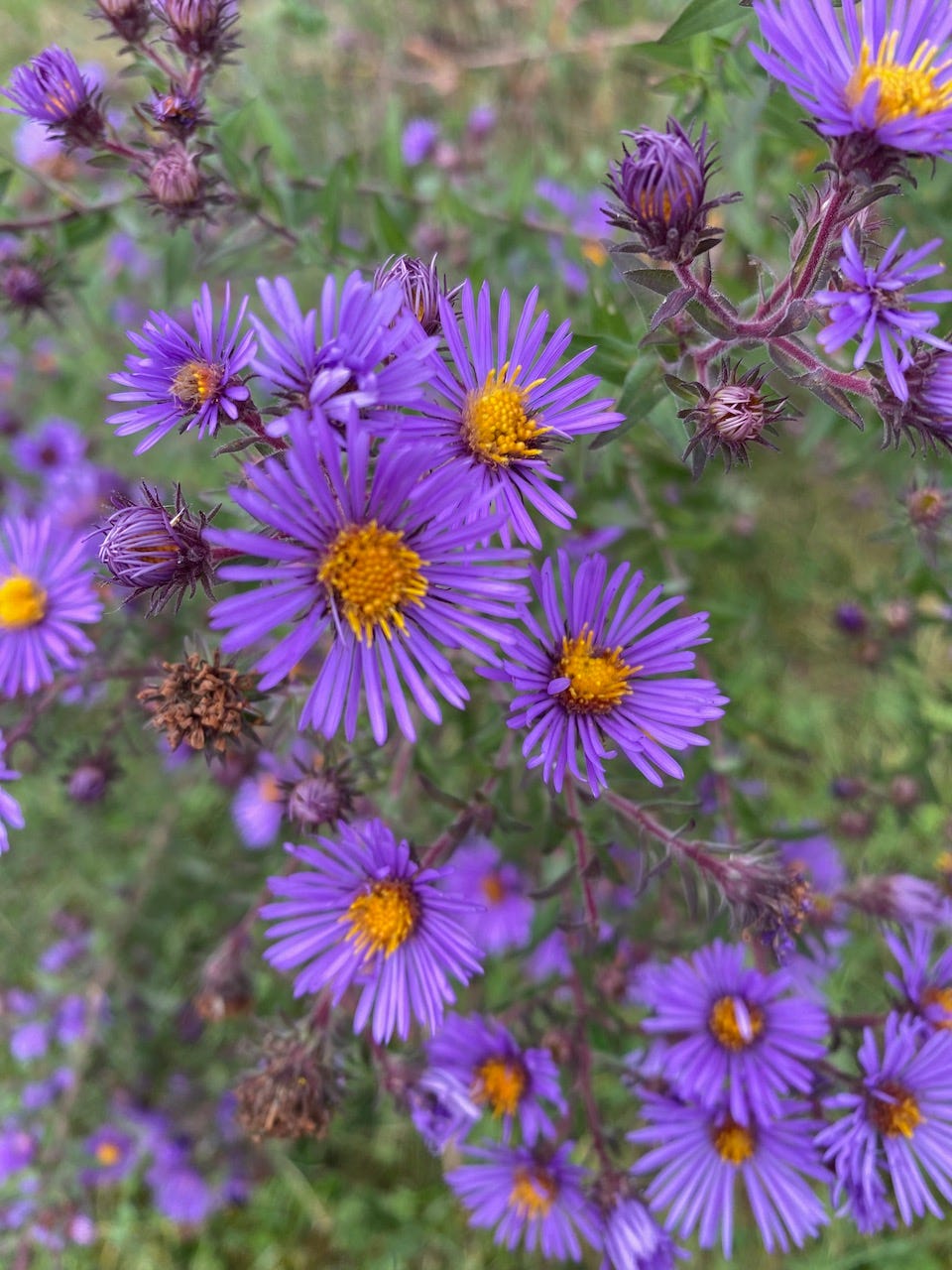The Wonder Report: September 30, 2022
A Livable Life: Part 2
Happy Friday —
Thank you to all who’ve grieved with me after the loss of my dog, Tilly. She was a good girl (most of the time!) and her absence is palpable. She never quite got used to me going to work each day — after I worked at home for the majority of her life. So before and after work each day, she was always right by my side. I’ve missed being able to reach down and scratch her ears or give her a kiss on the top of her head.
One thing about Tilly that I didn’t share last week is that she was my dog of hope. I first found out that Tilly needed a home just weeks after I said goodbye to my first black Lab, Precious. I also was just a couple of years out from a stage 4 cancer diagnosis and an even more recent recurrence. I wasn’t sure I should even get another dog with the precariousness of my health. But then a friend told me about a coworker who had black Lab puppies for sale, and the rest, I guess, is history. I brought Tilly home as an act of hope that I might live long enough to take care of her. And I did … for her whole life.
When I decided to write about her unexpected death last week, I forgot that I’d already typed out the title of the newsletter, A Livable Life, expecting to write about something else. It wasn’t until Saturday morning that I realized my mistake. When I went back in to change the title, though, I realized that the message of last week—that life unfolds before us in a kaleidoscope of pain, joy, suffering and hope—is actually part of what it means to lead a livable life. So instead of changing it, I simply added “Part 1” to the title. This week, we’ll continue with Part 2 … and who knows, there may even be a part 3 next week.
So let’s get right to it.
Viability
When I was a senior at Taylor University, I took a class called Contemporary Christian Belief. Part of the class was spent exploring the philosophical underpinnings of our faith in Jesus. But the majority of the time we explored how Christianity compared to other religions and philosophies. Particularly, we learned how to identify logical fallacies and to evaluate belief systems.
Among the many criteria we used to evaluate whether a worldview is true or not is the viability test: Is it livable? Practically speaking, the viability test simply asks whether a person could consistently follow all the teachings and principles of a belief system in contemporary life. If not, then it can’t be true.
We could probably have a good debate about how Christian belief does (or doesn’t) pass the viability test. (I happen to think it does.) But before we go too far down that path, I’d like us to apply the viability test to something a little less abstract: our regular, ordinary lives. Is it possible, with any consistency, to truly live the lives we’ve created for ourselves, lives filled with relationships, affiliations, and possessions; with multiple jobs, side gigs, and hobbies; complete with passions, opinions, and obsessions; not to mention a bevy of subscriptions, streaming services, and memberships; plus all our possessions, keepsakes, and treasures.
Or to say it more simply, is it possible to consistently live our own lives as we’ve constructed them? And more importantly, what are the consequences if we cannot?
These are questions I’ve been asking myself for a while now, but especially the past four months when several personal and career changes have given me the opportunity to reconfigure the shape of my life. In some ways, this season has been one of continual loss, as I set aside the work, rituals, and even the relationships that have been part of my life over the past 10 years. Of course I’ve also taken on new roles, habits, and relationships, but in receiving my new circumstances primarily as limitations—what I’ve had to leave behind—the pendulum has swung too far. I’ve scaled back too much. I’ve trimmed away too many things. For life to be viable at this point, I need to add some things back in.
Strangely, the things I miss the most are not the things I gave my life to over the length of my career: the hustle, the deadlines, the accomplishments. If anything, I miss a version of me that used to want those things, but not the things themselves. Rather, the absent things that are making life feel unlivable right now are actually those habits of beauty I turned to in my grief last year, in the days and months after I lost Mom. Things like spending time outside, painting and drawing, reading good fiction, baking pies and cakes, journaling about nature, giving myself extra space and time just to be. These were the gifts God used to keep me from falling and eventually to bring some measure of healing to my life. I went without them for years, before grief brought them back to me, but now that I’ve had them again, life feels unlivable without them.
To have these things again means more loss. While a livable life isn’t measured only by limits, they exist nonetheless. With only so much time in a day, I can’t possibly do it all. There’s nothing viable about that. But perhaps the thing that makes this life the most livable is that in the midst of it, I keep learning. I keep listening. I keep hearing from God how to tweak and trim and turn in a new direction.
Ultimately, following Him is what makes a life truly livable. And oh, how I want to truly live.
I wonder … does your life pass the viability test? What do you need to remove to make it more livable? What do you need to add?

Enough Is Enough
This recent article from the LA Times captures at least one part of what it means to lead a livable life. It’s about actor and director Jonah Hill, who has announced that he will no longer do live publicity appearances related to his work because they cause him to have anxiety attacks.
On the one hand, this article is about a slow but needed correction in our culture to acknowledge and care for people’s mental health as much as we do their physical health. But deeper than that, this article seems to be about the decisions we often need to make in order for life to be more viable, more sustainable.
Hill acknowledges that not everyone is in a position to make choices like his. I feel the same way about my own life: I live in a place where art and nature and time are available to me, at a cost I’m capable of paying. At the same time, I think many of us have the opportunity to say no to some things in our lives that would make room for better yes’s. It’s up to us to figure out what those are.
I wonder … what do you think about Hill’s decision? Are there things you need to say no to, even things that might otherwise feel like nonnegotiables, in order for your life to feel more livable?
Rule of Life
A practical way to ensure our lives are truly livable is to develop a Rule of Life. A Rule of Life is an ancient practice that establishes guidelines for what we will add and what we will remove from our lives to most fully live the way God intends for us. It includes spiritual rituals, like Bible reading and prayer, but also other kinds of habits that ensure we are in right relationship with the people, places, and practices that make us who we are.
I have a Rule of Life that is now completely obsolete, since I haven’t taken the time to update it in several months. It’s one of the things I need to make time for in the near future. If you’re interested in developing your own Rule of Life, here are a few resources to get you started:
Writing a Rule of Life: A Timeless Tool for Decision-Making by Tsh Oxenreider for Public Discourse, January 13, 2021
There’s No Such Thing as Time Management by Jen Pollock Michel for Christianity Today, December 29, 2021
Writing a Rule of Life by Jen Pollock Michel on Substack, August 15, 2022
Well, you’ve come to the end of another Wonder Report. Thanks again for joining me. It’s a privilege to share this space with you and to enter into these conversations together.
As always, if you’d like to send me a note or ask a question, you can hit reply and end up in my inbox. Or you can also leave a comment on this newsletter, which will live in the archive over on Substack. I can’t always respond quickly, but I always respond.
Until next time,
Charity




I loved this issue - thank you for helping me pause and consider whether my life is truly livable in its current form. I am grateful for Jonah Hill's courage to step back and take care of his mental health.